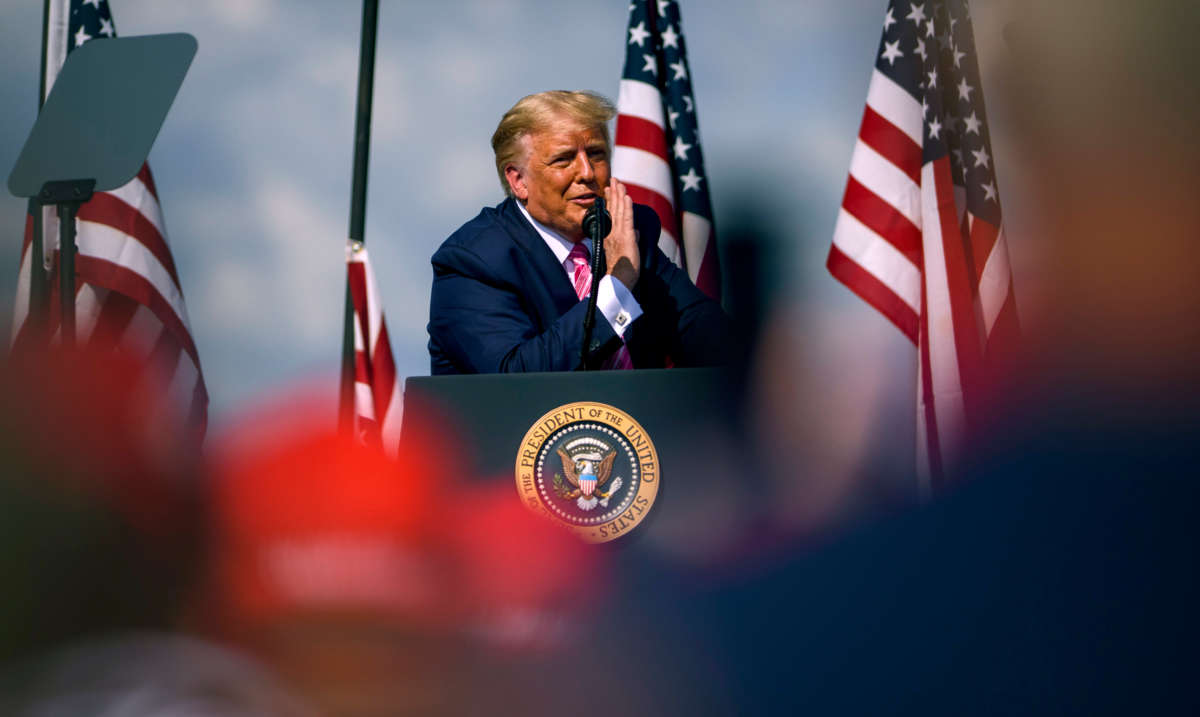Part of the Series
Voting Wrongs
On the afternoon of November 4, we found ourselves in the scenario many feared: a dead-heat election with the incumbent president refusing to accept the results if they do not favor him, declaring widespread fraud and calling for an end to the vote count while hundreds of thousands of legally cast ballots remain untallied.
The overarching need now is for bipartisan unity to defend the integrity of the vote count.
Election integrity should not be a partisan issue, and unfounded allegations of fraud should not be weaponized by partisan candidates. To be clear, there has never been any evidence to support Donald Trump’s claim of widespread Democratic voter fraud or millions of illegal votes cast. This is conspiracy theory and self-serving propaganda, period.
The true threats to democracy continue to come from money in politics, gerrymandering, voter suppression and the ongoing vulnerability of our electronic voting systems to fraud and hacking. In 2020, uncounted mail-in ballots are also a significant problem. Right now, hundreds of thousands of ballots — cast by both Republicans and Democrats — are missing in the U.S. Postal Service system.
As elections officials and poll workers struggle to get every vote counted in tight races, we should keep our eyes on the integrity and transparency of the process in key swing states. Georgia in particular has a long history of voter suppression, partisan control of voting processes, and last-minute voting machine “upgrades” and “patches” that cybersecurity experts warn are uncertified and unsafe. This happened again in 2020 with Georgia’s hotly contested new ballot-marking devices, which malfunctioned and had to be reprogrammed right before the general election.
In a lawsuit brought by Georgia democracy advocates, U.S. District Judge Amy Totenberg found that Georgia’s ballot-marking devices present “serious system security vulnerability and operational issues that may place Plaintiffs and other voters at risk of deprivation of their fundamental right to cast an effective vote that is accurately counted.”
Judge Totenberg’s October ruling concluded that the “risks are neither hypothetical nor remote under the current circumstances,” but declined to order action from Georgia officials, citing Supreme Court precedent that recommended lower courts use “great restraint” in ordering any substantial changes in close proximity to an election.
It is imperative that Secretary of State Brad Raffensperger and Gov. Brian Kemp do what they can now to ensure an honest, verified, vote count in 2020. This may include conducting a post-election, risk-limiting audit.
While a full public hand-count of voter-marked paper ballots is the gold standard for democratic process, it is not possible in states using paperless touchscreen machines or ballot-marking devices, which don’t allow a voter to fill out their own ballot.
Risk-limiting audits are not a full recount; instead, they verify a statistically significant number of ballots in order to detect error or fraud. While imperfect, risk-limiting audits are the only process currently offered by counties and states to verify the machine count. If a risk-limiting audit is undertaken, the locations and ballots selected for review should be chosen through a transparent process of random selection to prevent any manipulation of the audit itself. Experts agree that audits should not be done by scanning barcodes or QR codes on ballots, but by hand-counting human readable names.
People in the U.S. are already united in support of common-sense reform that protects election integrity. In 2018, democracy advocates garnered strong bipartisan support for the Secure Elections Act, which would provide minimal cybersecurity and accountability standards including ensuring all votes are cast on paper that can be audited and recounted. But the Secure Elections Act was blocked by Mitch McConnell and the White House.
Moving forward, we must continue to grow even stronger and create more insistent bipartisan support for election reform that protects the voting rights of all U.S. voters and builds integrity in our democratic process. These reforms must take place with sufficient time to revamp our voting system before the 2022 elections.
Join us in defending the truth before it’s too late
The future of independent journalism is uncertain, and the consequences of losing it are too grave to ignore. To ensure Truthout remains safe, strong, and free, we need to raise $17,000 by midnight tonight. Every dollar raised goes directly toward the costs of producing news you can trust.
Please give what you can — because by supporting us with a tax-deductible donation, you’re not just preserving a source of news, you’re helping to safeguard what’s left of our democracy.
